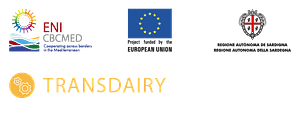ELCIM is an implementing partner in Lebanon of the TRANSDAIRY project (‘TRANSborder Key Enabling Technologies and Living Labs for the DAIRY value chain’) funded by the European Union under the ENI CBC Med Programme.
TRANSDAIRY, coordinated by the University of Campania “Luigi Vanvitelli” (Italy), aims to enhance the technological transfer among research, industry and SMEs in the fields of Key Enabling Technologies applied to the Dairy Value Chain, by the creation of Living Labs, the increase of institutional capacities through training, and the development of market intelligence for sustainability and consolidation of spin-offs.
Duration: 30 months
The total budget of the project is €3.8 million with an EU contribution of €3.4 million (90%).
Main source of funding: European Union (ENI CBC Med Programme)
The project will provide financial support for the creation of startups, registration of patents, publications, training classes and workshops in a total of 8 living labs distributed across the Mediterranean area (Italy, Lebanon, Greece, and Tunisia).

The partnership includes research institutions, governmental organizations, and SMEs as follows:

Home to some of the world’s most ancient civilizations, hub for trade and transport, unique hotspot for biodiversity, the Mediterranean faces a multitude of common challenges, including climate change, pollution, youth unemployment and social inequality.
Acting together to address these challenges and improve the lives of men and women across the region is the impetus for the 2014-2020 ENI CBC “Mediterranean Sea Basin Programme”. ENI CBC Med is the largest Cross-Border Cooperation (CBC) initiative implemented by the EU under the European Neighbourhood Instrument (ENI).
The Programme brings together the coastal territories of 14 EU and partner countries, including Lebanon, in view of fostering fair, equitable and sustainable development on both sides of the EU’s external borders.
In the course of 30 months, the project will create Living Labs for the dairy value chain, in the areas of biotechnologies and ICTs. The Living Labs, mainly intended for young people and women, will support the creation of new companies and economic activities through the uptake of emerging technologies applied to the dairy value chain from the farm level up to delivery to the consumers.
The project will provide financial support for the creation of startups, registration of patents, publications, training classes and workshops in a total of 8 living labs distributed across the Mediterranean area (Italy, Lebanon, Greece, and Tunisia).
The involved regions share a DVC based on small farms generally family-run whose younger members tend to flee from such demanding jobs, faced by competition which offer low cost and low-quality imports. These regions are also facing climate change.
TRANSDIARY will try to modernize some practices and help the transition towards a model more adapted to the reality of today’s globalization.
Besides creating jobs, it will increase the quality and safety of dairy products, increase productivity, adopt new solutions and increase small farmers’ revenues.